module 7
1/33
There's no tags or description
Looks like no tags are added yet.
Name | Mastery | Learn | Test | Matching | Spaced |
|---|
No study sessions yet.
34 Terms
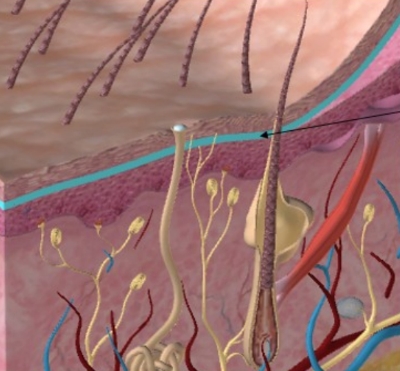
Identify the region and the layer of skin that is highlighted in blue. (Also indicated by the arrow,
below) *NOTE: To receive full credit you must label two regions
stratum granulosum; epidermis
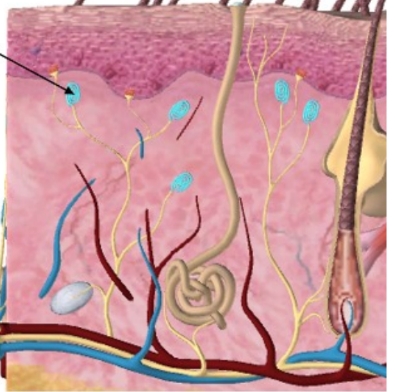
A- Identify the sensory cell receptor highlighted in blue, below, also indicated by the arrow.
B- What sensory information is detected by this type of receptor?
A: meisner’s corpuscles
B: detects light touch and vibration (mechanoreceptor)
the layers of the epidermis, from deep to superficial are:
Stratum basale, stratum spinosum, stratum granulosum, stratum corneum.
Exocrine glands secrete ______; Endocrine glands secrete ____.
B. into an epithelial lining, for body-wide distribution
C. through a duct, into the bloodstream
Which of the following is true regarding the epidermis:
The basement membrane contains its blood supply.
Match the cell with its single best description, using each description only once.
fibroblasts: produces collagen
keratinocytes: produces a protein to protect the skin
langerhans cells: assists in immune responses
melanocytes: produces a pigment that absorbs UV rays
A person touches a hot cup of coffee. What type of sensory organ detects this information?
Thermoreceptor
Merkel cells are embedded in what layer of the skin?
epidermis
In your own words, how can the skin be used to determine if a person is dehydrated?
Aperson who is dehydrated has decreased water content in the dermal layer of their skin.
A person can be tested for dehydration by pinching the skin on the back of the hand. One
indicator of dehydration is when the skin does not recoil back to its normal shape but
instead stays “ridged”
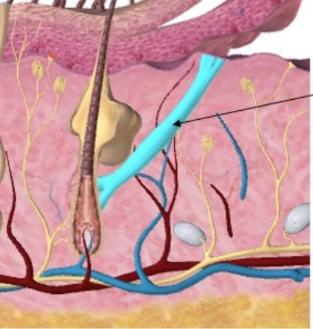
What is the name and function of the structure below? (Highlighted in blue, also indicated by the arrow
arrector pili, a smooth muscle which connects to each hair follicle. It contracts when the
body is cold or experiences emotional responses
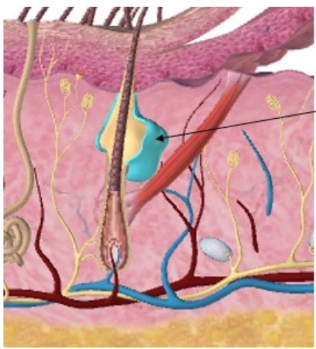
What is the name and function of the structure below? (Highlighted in blue, also indicated by the arrow
Sebaceous gland (oil gland) produces oil (sebum) to protect the skin and hair from drying.
All of the following are functions of skin except:
produce vitamin k
The thickest region of the dermis is the:
reticular
The hypodermis is comprised mainly of:
Adipocytes
What is a contusion?
Damage to a broken blood vessel
Information from a dermatome travels to:
the brain
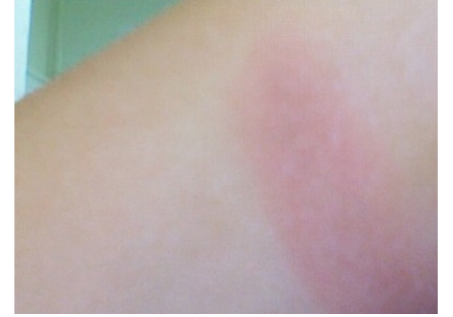
this injury, seen below, is best described as what degree of burn? Explain what layer/s of skin
are damaged in this type of burn.
First-degree burn, also called a superficial burn
Only the epidermis layer of the skin was damaged
(Optional: The burned area burned becomes dry, red, and painful, without blistering.
Your patient was injured in a cooking accident. The burn damaged the entire epidermis, dermis
and slightly into the subcutaneous layer.
1- What degree of burn best describes your patient’s injury?
2- Would your patient experience pain in the injured area? Why or why not
-3rd degree (full thickness)
-Yes, the extensive damage to the dermis layer of the skin makes third degree burns
extremely painful. Sensory receptors are damaged but still present, so the patient
experiences pain.
This part of a hair contains blood and nervous supply:
bulb
Hair is made up of:
Dead epidermal cells converted to keratin
Nails are hard, dead cells which have been converted to _____
Keratin
the nail _____ is the visible portion of the nail
body
What is a skin graft?
skin grafting is a treatment where healthy skin is taken from a person’s own body and
grafted on top of the damaged area
What substance from the blood accumulates to form a clot?
platelets
Mast cells secrete what chemical?
histamine
Macrophages_____
engulf bacteria.
A scar ______.
is an overgrowth of fibrous connective tissue.
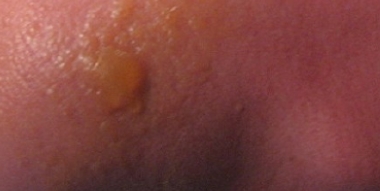
this injury, seen below, is best described as what degree of burn? Explain what layer/s of skin are damaged in this type of burn.
second-degree burn, also called a partial thickness burn
The epidermis and dermis layers of the skin was damaged
your patient was injured in a house fire. The skin sustained damage through the epidermis, dermis, hypodermis, and some muscle tissue.
1- What degree of burn best describes your patient’s injury?
2- Would your patient experience pain in the injured area? Why or why not
1) This patient has fourth degree burn.
2)Sense the nerve endings are destroyed in the affected area, the patient will not feel pain in that area
the nail _____ is a portion of the nail not visible
root
1. Why would a person receive a skin graft?
skin graft may be required if the skin has been severely damaged or if a burn covers a large area. Skin
grafting is a treatment that can be used with burn victims to help in damaged skin recovery. Its when
healthy skin is grafted on top of damaged skin